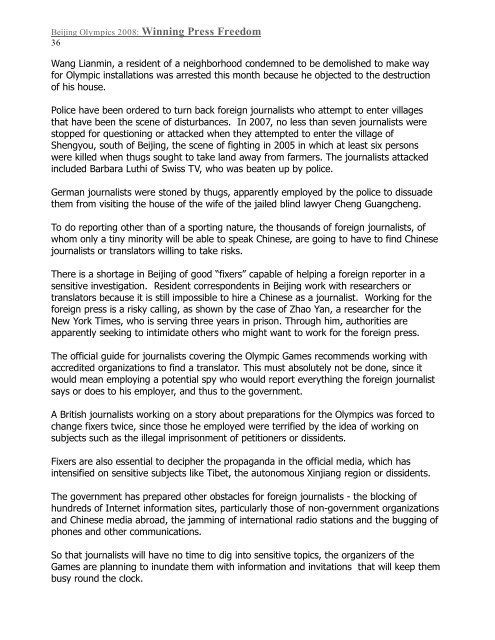Beijing Olympics 2008: Winning Press Freedom - World Press ...
Beijing Olympics 2008: Winning Press Freedom - World Press ...
Beijing Olympics 2008: Winning Press Freedom - World Press ...
Create successful ePaper yourself
Turn your PDF publications into a flip-book with our unique Google optimized e-Paper software.
<strong>Beijing</strong> <strong>Olympics</strong> <strong>2008</strong>: <strong>Winning</strong> <strong>Press</strong> <strong>Freedom</strong><br />
36<br />
Wang Lianmin, a resident of a neighborhood condemned to be demolished to make way<br />
for Olympic installations was arrested this month because he objected to the destruction<br />
of his house.<br />
Police have been ordered to turn back foreign journalists who attempt to enter villages<br />
that have been the scene of disturbances. In 2007, no less than seven journalists were<br />
stopped for questioning or attacked when they attempted to enter the village of<br />
Shengyou, south of <strong>Beijing</strong>, the scene of fighting in 2005 in which at least six persons<br />
were killed when thugs sought to take land away from farmers. The journalists attacked<br />
included Barbara Luthi of Swiss TV, who was beaten up by police.<br />
German journalists were stoned by thugs, apparently employed by the police to dissuade<br />
them from visiting the house of the wife of the jailed blind lawyer Cheng Guangcheng.<br />
To do reporting other than of a sporting nature, the thousands of foreign journalists, of<br />
whom only a tiny minority will be able to speak Chinese, are going to have to find Chinese<br />
journalists or translators willing to take risks.<br />
There is a shortage in <strong>Beijing</strong> of good “fixers” capable of helping a foreign reporter in a<br />
sensitive investigation. Resident correspondents in <strong>Beijing</strong> work with researchers or<br />
translators because it is still impossible to hire a Chinese as a journalist. Working for the<br />
foreign press is a risky calling, as shown by the case of Zhao Yan, a researcher for the<br />
New York Times, who is serving three years in prison. Through him, authorities are<br />
apparently seeking to intimidate others who might want to work for the foreign press.<br />
The official guide for journalists covering the Olympic Games recommends working with<br />
accredited organizations to find a translator. This must absolutely not be done, since it<br />
would mean employing a potential spy who would report everything the foreign journalist<br />
says or does to his employer, and thus to the government.<br />
A British journalists working on a story about preparations for the <strong>Olympics</strong> was forced to<br />
change fixers twice, since those he employed were terrified by the idea of working on<br />
subjects such as the illegal imprisonment of petitioners or dissidents.<br />
Fixers are also essential to decipher the propaganda in the official media, which has<br />
intensified on sensitive subjects like Tibet, the autonomous Xinjiang region or dissidents.<br />
The government has prepared other obstacles for foreign journalists - the blocking of<br />
hundreds of Internet information sites, particularly those of non-government organizations<br />
and Chinese media abroad, the jamming of international radio stations and the bugging of<br />
phones and other communications.<br />
So that journalists will have no time to dig into sensitive topics, the organizers of the<br />
Games are planning to inundate them with information and invitations that will keep them<br />
busy round the clock.





